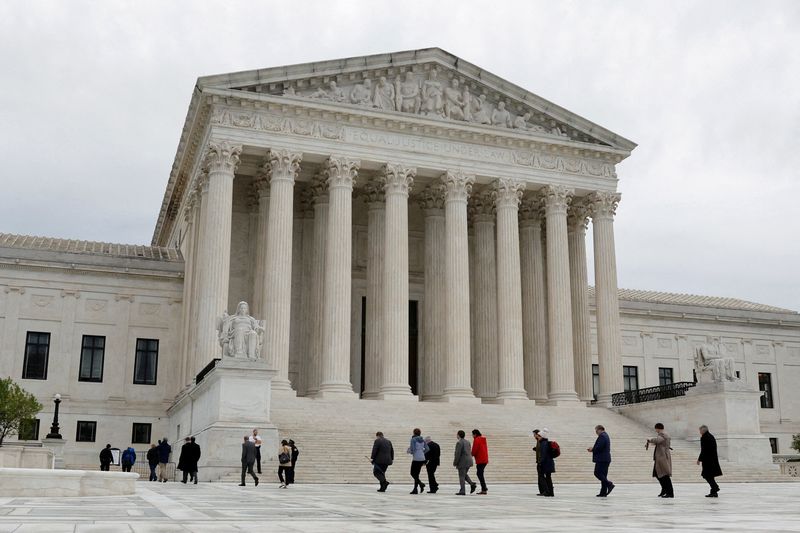By John Kruzel
WASHINGTON (Reuters) -The U.S. Supreme Court on Monday agreed to hear a bid by South Carolina officials to revive a Republican-crafted voting map that a lower court said had unconstitutionally "exiled" 30,000 Black voters from a closely contested congressional district.
The justices took up an appeal by South Carolina officials of a federal judicial panel's ruling that found the Republican-drawn map had deliberately split up Black neighborhoods in Charleston County in a "stark racial gerrymander" and ordered the district to be redrawn.
Gerrymandering is a practice involving the manipulation of electoral district boundaries to marginalize a certain set of voters and increase the influence of others. In this case, the Republican legislators were accused of racial gerrymandering to reduce the influence of Black voters.
Legislative districts across the United States are redrawn to reflect population changes documented in the nationwide census conducted by the federal government every decade. South Carolina's Republican-controlled legislature adopted a new voting map last year following the 2020 U.S. census.
In a major blow to election reformers, the Supreme Court in 2019 rejected efforts to rein in gerrymandering done for partisan advantage, finding that federal judges do not have the authority to curb the practice. Alleged race-based gerrymandering can be challenged in federal courts but the Supreme Court, which has a conservative majority, has rolled back protections over the past decade.
In the South Carolina case, the map at issue set new boundaries for the state's 1st congressional district, which for almost four decades had consistently elected a Republican to the House until 2018, when a Democrat secured what was widely seen as an upset victory. In 2020, Republican Nancy Mace won the district by just over 1 percentage point.
In redrawing the district last year, Republicans moved more than 30,000 Black residents in Charleston County to the neighboring majority-Black 6th congressional district, which for more than 30 years has been represented in the House by Representative James Clyburn, a Black Democratic legislator.
The Republican map resulted in a 1st district with a larger percentage of white, Republican-leaning voters. Mace, who is white, won re-election by 14 percentage points last November under the district's new configuration.
The state conference of the NAACP civil rights group sued in 2022, arguing that several House districts created under the map were designed at least in part with "a racially discriminatory intent to discriminate against Black voters in violation of the U.S. Constitution."
A federal three-judge panel in January ruled that the way the 1st district was drawn violated the rights of Black voters under the Constitution's 14th and 15th Amendments, which guarantee equal protection under the law and prohibit race-based voting discrimination.
The strategies employed in drawing the district boundaries, the panel wrote, "ultimately exiled over 30,000 African American citizens from their previous district and created a stark racial gerrymander of Charleston County and the City of Charleston."
The judges - all three appointed by Democratic presidents - ruled that no elections could take place in the 1st district until it has been redrawn, prompting the South Carolina Republican officials to appeal to the Supreme Court.
South Carolina NAACP and Taiwan Scott, a Black voter who lives in South Carolina's 1st congressional district, on Monday urged the justices to uphold the lower court's ruling.
"South Carolina's congressional map is the latest instance in our state's long, painful history of racial discrimination that must be remedied," they said in a statement. "As the case moves to oral argument, we implore the court to uphold the panel's decision and protect Black South Carolina voters from this egregious form of discrimination."
The case will be heard during the Supreme Court's next term, which begins in October.

Redistricting in most states is carried out by the party in power, though some states assign the task to independent commissions to ensure fairness. Gerrymandering typically involves packing voters who tend to favor a particular party into a small number of districts to diminish their statewide voting power while dispersing others in districts in numbers too small to be a majority.
In another case involving redistricting and race, the Supreme Court is weighing Alabama's appeal of a lower court's ruling that a Republican-drawn electoral map setting the boundaries of the state's seven U.S. House districts unlawfully diluted the influence of Black voters. A decision in the case is expected by late June.